人教版八年级英语下册笔记
人教版八下全册英语重要知识点、笔记
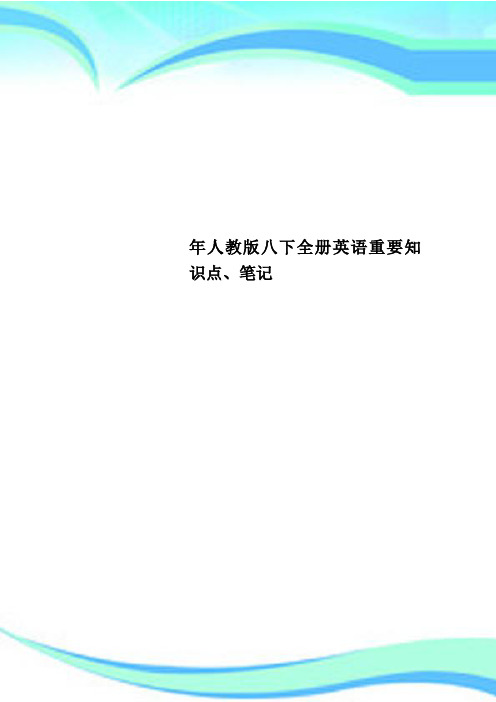
年人教版八下全册英语重要知识点、笔记————————————————————————————————作者:————————————————————————————————日期:Unit 1 What’s the matter?【应掌握的词组】1-1 询问What’s the matter? 怎么了?= What’ the matter with you?= What’s the troubl e?= What’s the trouble with you?= what’s up?= what’s up with you?= Is there anything wrong?= Is there anything wrong with you?= What’s wrong?= What’s wrong with you?= What has happened to you?1-2 疾病I have a sore throat / back .have a (bad) cold (重)感冒have a toothache 牙痛have a fever 发烧have a sore throat喉咙痛,咽喉痛have a sore back 背痛have a backachehave a headache 头痛have a stomachache 胃痛;肚子痛(用bad 表示程度“严重,厉害”)have a(bad)headache 头痛得厉害I have a stomachache 我胃痛= I have got a stomachache= There is something wrong with my stomach.= My stomach hurts. ( hurt vi. 感到疼痛;有坏处;带来痛苦) = I have (got) a pain in my stomach. / pein /I am sick .1-3 难题I am hungry ( thirsty ).I am stressed out .I am weak / tired.1-4 感觉How are you feeling now ?I’m not feeling(very)well/ fine/all right.. 我觉得不太舒服=I don’t feel very well.= I’m feeling ill / sick.=I feel terrible / bad.I hope you feel better soon .I feel sore all over . all over: 到处,遍及;浑身2. neck and neck 并驾齐驱,齐头并进/ negenek/3. go to bed early 早早上床睡觉4. some conversation practice 一些对话练习5. for example 例如6. listen to music 听音乐7. go to the party 去参加晚会8. It’s + adj. + to do sth. (干某事怎么样);It’s +adj. + (for sb.) to do sth. (对某人来说干某事怎么样);—It’s difficul t to learn English well. (学好英语很难)—It’s easy to do it.(做它很容易)—It’s important for us to keep healthy. (对我们来说保持健康很重要。
八年级下册人教版英语笔记

八年级下册人教版英语笔记一、Unit 1 What's the matter?1. 重点单词。
- matter:n. 问题;事情。
常用搭配:What's the matter (with sb.)? = What's wrong (with sb.)? = What's the trouble (with sb.)?(某人)怎么了?- sore:adj. 疼痛的;酸痛的。
例如:a sore throat喉咙痛。
- stomachache:n. 胃痛;腹痛。
- foot:n. 脚;足。
复数形式是feet。
- neck:n. 脖子;颈部。
- fever:n. 发烧。
have a fever发烧。
- lie:v. (lay - lain)躺;平躺。
lie down躺下。
- rest:v. & n. 放松;休息。
take breaks/take a break = have a rest休息。
- cough:v. & n. 咳嗽。
have a cough咳嗽。
- toothache:n. 牙痛。
2. 重点短语。
- have a cold:感冒。
- have a stomachache:胃痛。
- lie down and rest:躺下休息。
- drink some hot tea with honey:喝些加蜂蜜的热茶。
- see a dentist:看牙医。
- get an X - ray:拍X光片。
- take one's temperature:量体温。
3. 重点句型。
- What should I do? 我应该做什么?- You should see a dentist and get an X - ray. 你应该去看牙医并拍X光片。
- Should I put some medicine on it? 我应该在上面敷些药吗?- Yes, you should. / No, you shouldn't. 是的,你应该。
人教版八下英语知识点笔记
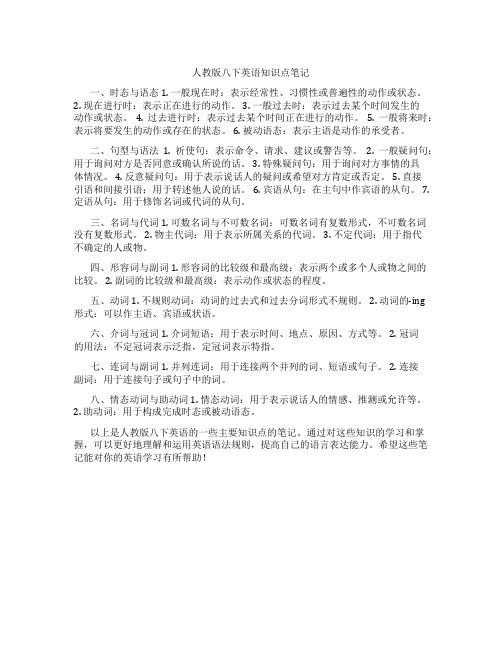
人教版八下英语知识点笔记一、时态与语态 1. 一般现在时:表示经常性、习惯性或普遍性的动作或状态。
2. 现在进行时:表示正在进行的动作。
3. 一般过去时:表示过去某个时间发生的动作或状态。
4. 过去进行时:表示过去某个时间正在进行的动作。
5. 一般将来时:表示将要发生的动作或存在的状态。
6. 被动语态:表示主语是动作的承受者。
二、句型与语法1. 祈使句:表示命令、请求、建议或警告等。
2. 一般疑问句:用于询问对方是否同意或确认所说的话。
3. 特殊疑问句:用于询问对方事情的具体情况。
4. 反意疑问句:用于表示说话人的疑问或希望对方肯定或否定。
5. 直接引语和间接引语:用于转述他人说的话。
6. 宾语从句:在主句中作宾语的从句。
7. 定语从句:用于修饰名词或代词的从句。
三、名词与代词 1. 可数名词与不可数名词:可数名词有复数形式,不可数名词没有复数形式。
2. 物主代词:用于表示所属关系的代词。
3. 不定代词:用于指代不确定的人或物。
四、形容词与副词 1. 形容词的比较级和最高级:表示两个或多个人或物之间的比较。
2. 副词的比较级和最高级:表示动作或状态的程度。
五、动词 1. 不规则动词:动词的过去式和过去分词形式不规则。
2. 动词的-ing形式:可以作主语、宾语或状语。
六、介词与冠词 1. 介词短语:用于表示时间、地点、原因、方式等。
2. 冠词的用法:不定冠词表示泛指,定冠词表示特指。
七、连词与副词 1. 并列连词:用于连接两个并列的词、短语或句子。
2. 连接副词:用于连接句子或句子中的词。
八、情态动词与助动词 1. 情态动词:用于表示说话人的情感、推测或允许等。
2. 助动词:用于构成完成时态或被动语态。
以上是人教版八下英语的一些主要知识点的笔记。
通过对这些知识的学习和掌握,可以更好地理解和运用英语语法规则,提高自己的语言表达能力。
希望这些笔记能对你的英语学习有所帮助!。
人教部编版八年级英语下册第4单元笔记重点汇总(可直接打印)
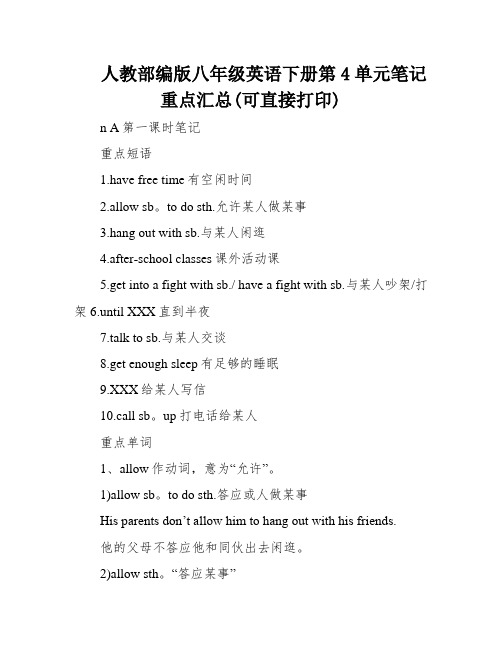
人教部编版八年级英语下册第4单元笔记重点汇总(可直接打印)n A第一课时笔记重点短语1.have free time有空闲时间2.allow sb。
to do sth.允许某人做某事3.hang out with sb.与某人闲逛4.after-school classes课外活动课5.get into a fight with sb./ have a fight with sb.与某人吵架/打架6.until XXX直到半夜7.talk to sb.与某人交谈8.get enough sleep有足够的睡眠9.XXX给某人写信10.call sb。
up打电话给某人重点单词1、allow作动词,意为“允许”。
1)allow sb。
to do sth.答应或人做某事His parents don’t allow him to hang out with his friends.他的父母不答应他和同伙出去闲逛。
2)allow sth。
“答应某事”I don't think she will allow it.我想她不会允许这件事情。
3)allow XXX.“允许做某事”XXX.在我们家不允许抽烟。
4)XXX.“被答应做某事”Passengers are not allowed to smoke on the bus.在公交车上,乘客不允许抽烟。
2、XXX.发觉或人在做某事其中的doing(现在分词)作宾语补足语。
类似的还有: XXX。
意为“看到/窥察到XXX听到XXX留意到XXX觉得或人在做某事”。
3、词语辨析:太多:too much+不可数名词例:too much homework太多功课太多:too many +可数名词复数例:too many people太多人太:much too+副词或形容词例:much too salty太咸重点句型1、What’s wrong with。
意为“……怎样了?”相当于What’s the matter with。
人教版八年级下册英语_Unit1-5_单元笔记+练习
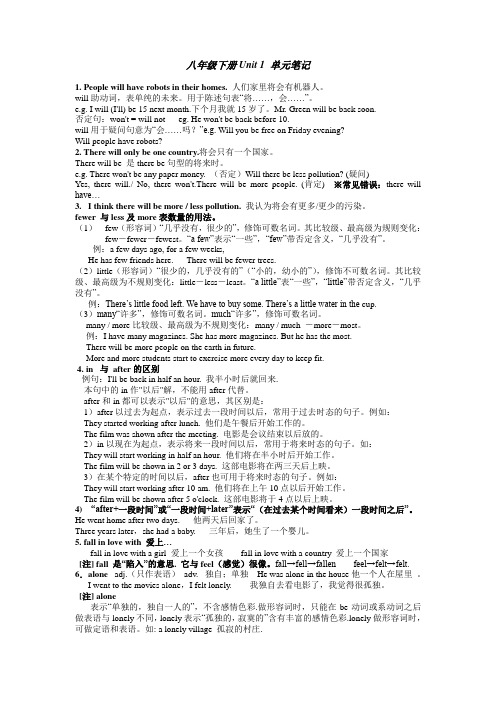
八年级下册Unit 1 单元笔记1. People will have robots in their homes. 人们家里将会有机器人。
will助动词,表单纯的未来。
用于陈述句表―将……,会……‖。
e.g. I will (I'll) be 15 next month.下个月我就15岁了。
Mr. Green will be back soon.否定句:won't = will not eg. He won't be back before 10.will用于疑问句意为―会……吗?‖e.g. Will you be free on Friday evening?Will people have robots?2. There will only be one country.将会只有一个国家。
There will be 是there be句型的将来时。
e.g. There won't be any paper money. (否定)Will there be less pollution? (疑问)Yes, there will./ No, there won't.There will be more people. (肯定) ※常见错误:there will have…3. I think there will be more / less pollution. 我认为将会有更多/更少的污染。
fewer 与less及more表数量的用法。
(1)few(形容词)―几乎没有,很少的‖,修饰可数名词。
其比较级、最高级为规则变化:few-fewer-fewest。
―a few‖表示―一些‖,―few‖带否定含义,―几乎没有‖。
例:a few days ago, for a few weeks,He has few friends here. There will be fewer trees.(2)little(形容词)―很少的,几乎没有的‖(―小的,幼小的‖),修饰不可数名词。
人教版八年级英语下册笔记(原创版)
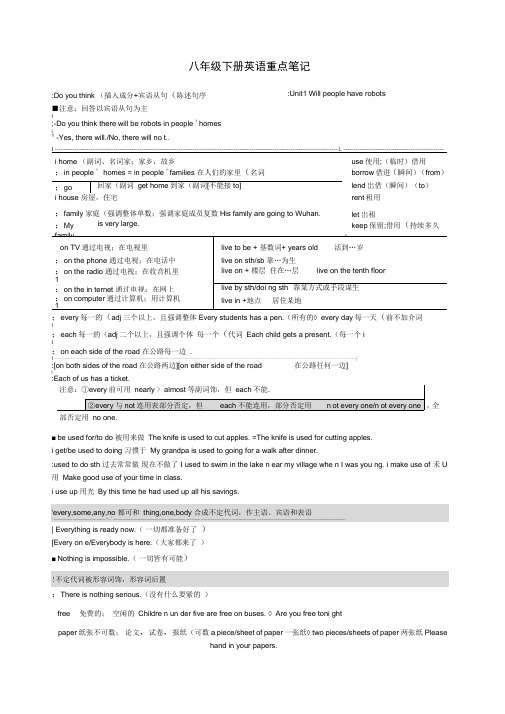
八年级下册英语重点笔记:Do you think (插入成分+宾语从句(陈述句序 ■注意:回答以宾语从句为主I;-Do you think there will be robots in people 'homesi1-Yes, there will./No, there will no t..I ------------------------------------------------------------------------------------------------------------------------------------------------ L ---------------------------------------------------i home (副词、名词家;家乡,故乡use 使用;(临时)借用 ;in people ' homes = in people 'families 在人们的家里(名词 borrow 借进(瞬间)(from ) ;gohome 回家(副词 get home 到家(副词[不能接to]lend 岀借(瞬间)(to ) i house 房屋,住宅rent 租用 ;family 家庭(强调整体单数;强调家庭成员复数His family are going to Wuhan.let 岀租;Myfamilyis very large.keep 保留;借用(持续多久 -on TV 通过电视;在电视里live to be + 基数词+ years old 活到…岁;on the phone 通过电视;在电话中live on sth/sb 靠…为生;on the radio 通过电视;在收音机里1live on +楼层 住在…层live on the tenth floor;on the in ternet 通过电视;在网上 live by sth/doi ng sth 靠某方式或手段谋生 ;on computer 通过计算机;用计算机1live in +地点 居住某地;every 每一的(adj 三个以上,且强调整体Every students has a pen.(所有的◊ every day 每一天(前不加介词 I;each 每一的(adj 二个以上,且强调个体 每一个(代词 Each child gets a present.(每一个iI;on each side of the road 在公路每一边 .I --------------------------------------------------------------------------------------------------------------------------------------------------------------------------j:[on both sides of the road 在公路两边][on either side of the road在公路任何一边]||:Each of us has a ticket.■ be used for/to do 被用来做 The knife is used to cut apples. =The knife is used for cutting apples. i get/be used to doing 习惯于 My grandpa is used to going for a walk after dinner.:used to do sth 过去常常做 现在不做了 I used to swim in the lake n ear my village whe n I was you ng. i make use of 禾U 用 Make good use of your time in class.i use up 用光 By this time he had used up all his savings.| Everything is ready now.( 一切都准备好了 ) [Every on e/Everybody is here.(大家都来了 ) ■ Nothing is impossible.( 一切皆有可能) ;There is nothing serious.(没有什么要紧的 )free 免费的; 空闲的 Childre n un der five are free on buses. ◊ Are you free toni ghtpaper 纸张不可数; 论文,试卷,报纸(可数a piece/sheet of paper 一张纸◊ two pieces/sheets of paper 两张纸 Pleasehand in your papers.:Unit1 Will people have robots;in + 时段(将来时He will get there in three days.I;after + 过去时段/ 将来时点I'llbe free after Friday. After three years he came back to China.:时段+later (副词I will see you later. [after two hours=two hours later]II __________ _______ ___ _________ — _________ _ __________ __________ _ 一一 _____ ____________________ ____________________________ ___ ____________________________ ___ _____ __________________________ ___________________________ ____ I;live 居住He lives at home pleasantly.I;stay 暂住He'lstay at the hotel for two days.Ii ' ' ':few fewer(较少的)+ [可数复数]little less(较少的)+[不可数]I;many more(较多的)+ [可数复数] much more(较多的)+[不可数]I1 ___________________ __ ______________ ____________________________________________ __________________________________________ ___ —I:agree to sth 同意(计划、办法、建议、条件He agree to the plan.I;agree to do sth 同意做某事I agree to meet him tomorrow.I:agree with sb/ 意见/看法I don ' agree with him/what he said.I:agree on/upon 就取得一致We agree on the plan.I;agree with sth 适合(事物、气候、话语The food does not agree with me.I__ ____I-';before 过去起点时段前(完成时He said that his parents had died ten years before .I;ago 现在起点时段前(过去时I Two day ago, I we nt to see him.II ' —:一般将来时will/shall + do I 'come and see you n ext year.I;There will be + 名词=There is/are going to be 将会有There will be a football match this after noon.;There is going to be a football match this after noon.Il=:space 太空(不可数;空间(可数、不可数The earth travels around the sun in space.◊space station 太空站\ Is there any room/space for me:room 房间(可数;空间(不可数I Could you please make room for meI:place 地方;地点(可数I Yueyang is a beautiful place.i■ fly①乘、驾驶、放飞(vt.) I can ' fly a plane. ◊fly a kite 放风筝;②飞行;飞逝(vi.)I'llfly to Lon don tomorrow. ◊Time flies.时光飞逝^ How time flies.光阴似箭II 11: 1 1 1' [11;because [从属连词We can 'go out because the weather is terrible.;because of [介词短语We can ' go out because of the terrible weather.:注意:so(因此)为并列连词,不可与because 一起连用The weather is terrible, so we can 'go out.II:fall in love with =be in love with 爱上He fell in love with her at first sight. 他对她一见钟情—B■ ■ ■ ■■■■■ ■ ■ ■■■■ ■■■■■■ ■ ■ ■■ ■■■■■ ■ ■ ■ ■■■■■■ ■ ■ ■■■■■ ■ 一■ ■I[fall (掉下;跌倒;变为—fell —fallen fall asleep 入睡◊fall ill 生病◊fall into 陷入◊fall off 跌落◊fall down 跌:倒◊fall over 摔倒◊fall behind 落后I;feel (感觉;摸起来一felt —felt[as 像…一样(连词+从句;作为,以…身份(介词He works as others do.i;She worked as a teacher for ten years.;like 像…一样(介词+名词He spoke to her like her father.I;alone ①单独地(畐副词=by on eself It is too big a job for me to do alone.; ②单独的(形容词[客观实情He was alone in the house.;③仅仅(副词You can ' live on bread alone.i lonely孤独的[主观感受;荒凉的He was lonely in a lonely island.住在荒凉的岛上,他感到很孤独。
八年级下册英语笔记重点归纳

八年级下册英语笔记重点归纳一、Unit 1 What's the matter?1. 重点单词。
- matter n.问题;事情。
常用搭配:What's the matter (with sb.)?(某人)怎么了?- have a cold 感冒。
类似的表达还有:have a fever(发烧),have a cough (咳嗽)等。
- stomachache n.胃痛;腹痛。
“-ache”为后缀,表示疼痛,如:headache (头痛),toothache(牙痛)。
- foot n.脚,复数形式为feet。
- lie v.躺;平躺。
lie - lay - lain。
例如:You should lie down and rest.(你应该躺下休息。
)- rest v. n.放松;休息。
如:take a rest(休息一下)。
2. 重点短语。
- take one's temperature 量体温。
例如:The nurse took my temperature.(护士给我量了体温。
)- take breaks (take a break) 休息。
We should take breaks when we are tired.(当我们累的时候应该休息。
)- get off 下车。
He got off the bus at the next stop.(他在下一站下了公共汽车。
)- to one's surprise 使……惊讶的是;出乎……的意料。
To my surprise, he passed the exam.(令我惊讶的是,他通过了考试。
)- What should I do? 我应该做什么?用于询问建议。
- You should see a dentist and get an X - ray. 你应该去看牙医并且拍个X 光片。
should为情态动词,后接动词原形,表示建议。
人教版英语八年级下册知识点笔记
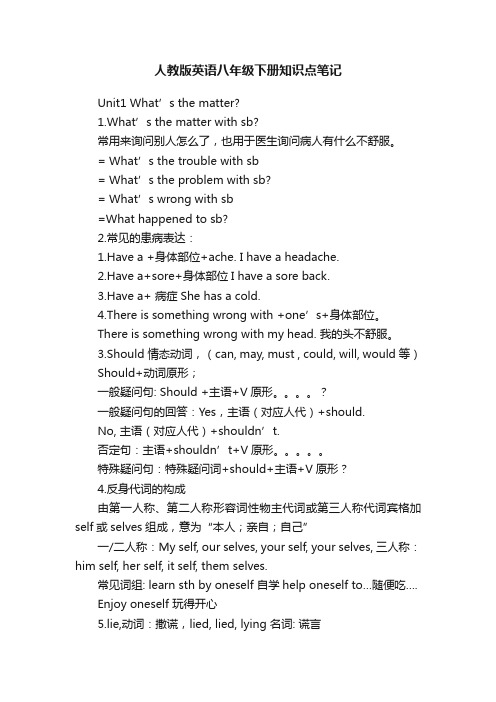
人教版英语八年级下册知识点笔记Unit1 What’s the matter?1.What’s the matter with sb?常用来询问别人怎么了,也用于医生询问病人有什么不舒服。
= What’s the trouble with sb= What’s the problem with sb?= What’s wrong with sb=What happened to sb?2.常见的患病表达:1.Have a +身体部位+ache. I have a headache.2.Have a+sore+身体部位I have a sore back.3.Have a+ 病症She has a cold.4.There is something wrong with +one’s+身体部位。
There is something wrong with my head. 我的头不舒服。
3.Should 情态动词,(can, may, must , could, will, would等)Should+动词原形;一般疑问句: Should +主语+V原形。
?一般疑问句的回答:Yes,主语(对应人代)+should.No, 主语(对应人代)+shouldn’t.否定句:主语+shouldn’t+V原形。
特殊疑问句:特殊疑问词+should+主语+V原形?4.反身代词的构成由第一人称、第二人称形容词性物主代词或第三人称代词宾格加self或selves组成,意为“本人;亲自;自己”一/二人称:My self, our selves, your self, your selves, 三人称:him self, her self, it self, them selves.常见词组: learn sth by oneself 自学help oneself to…随便吃….Enjoy oneself 玩得开心5.lie,动词:撒谎,lied, lied, lying 名词: 谎言lie,平躺,lay, lain, lying lie down 躺下lay, 下蛋,布置,laid, laid, laying.6.Without, 做介词,意为“没有;无”反义词为“with”后接名词/代词宾格/动名词7.动词固定搭配:1.be used to doing sth…习惯做某事2.have problems(in) doing sth 做某事有困难=have difficulty (in) doing sth=have trouble(in) doing sth.3.mean doing sth 意为着做某事mean to do sth 打算做某事词汇(红色为重要词汇):1.have a cold 感冒2.have a fever 发烧3.have a sore back 背痛4.have a stomachache 胃痛5.lie down and rest 躺下休息6.see a dentist 看牙医7.get an X-ray 拍X光片8.take one’s temperature 量体温9.cut oneself 割伤自己10.put some medicine on….在。
